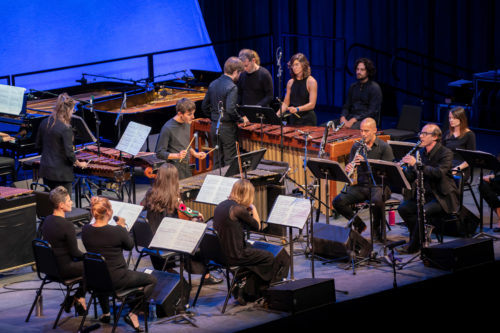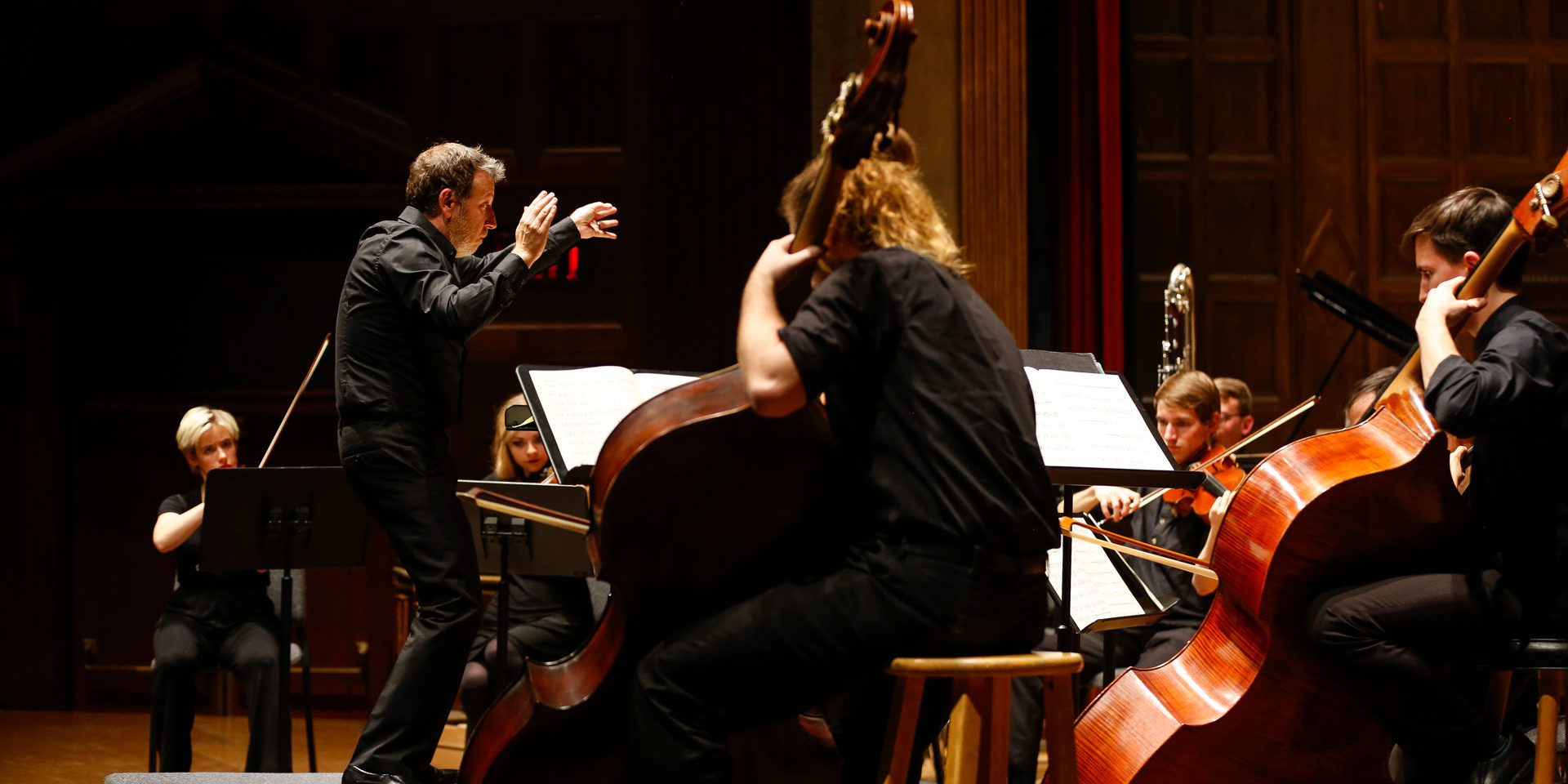—Interview conducted by Anastasia Maritsas ’25E, Eastman Communications ALP Intern
The Eastman School of Music’s contemporary music ensemble, Musica Nova, will be collaborating with members of the professional contemporary ensemble, Ensemble Signal, in a free concert on Monday, October 28th in Kodak Hall at Eastman Theatre at 7:30 p.m. The program consists of two major works by Steve Reich: Double Sextet (2007) and Music for 18 Musicians (1976). The first piece won Reich the Pulitzer Prize for composition, while the latter is a seminal work that has entered the musical canon, a great achievement for a work composed in the modern day.

Ensemble Signal performs Steve Reich’s Music for 18 Musicians (1974-76) hosted by John Schaefer for New Sounds Live at the Winter Garden, presented by Arts Brookfield, on October 15, 2019. Credit: Stephanie Berger.
Ensemble Signal is a NY-based new music ensemble founded by cellist and Eastman alumna Lauren Radnofsky ’03E, ’07E (MM) in 2008. Select members from the ensemble will be in residence to perform with Musica Nova. In addition to Radnofsky, alumni Adrián Sandí ’12E (DMA), clarinets, and Lauren Cauley ’12E, ’14E (MM), violin, will join. Signal’s sound director, Paul Coleman, is on the Eastman Community Music School faculty, and percussionist Doug Perkins attended Eastman. Also performing is David Friend on piano.
Radnofsky shares that Ensemble Signal got its start playing Reich’s music and has worked with Reich on nearly all of his works, so it is no wonder the ensemble is especially lauded for their interpretations of Reich’s music. It has recorded both Music for 18 Musicians and the Double Sextet. Scroll down to see a performance of Ensemble Signal at the Lincoln Center Festival in 2016.
“It’s an especially meaningful honor and privilege for Ensemble Signal to participate in the continuation of Eastman’s long standing engagement with modern music by bringing to the Eastman and Rochester community this project featuring music by Steve Reich, beloved collaborator of Ensemble Signal and one of our greatest living composers,” says Radnofsky.
Brad Lubman, the director of Musica Nova and conductor and co-artistic director for Ensemble Signal, has also worked very closely with Reich throughout his career. Lubman first met Reich at the Bang on the Can Festival in 1995, where Lubman was conducting a chamber orchestra concert. Following this meeting, Reich extended an invite to Lubman to collaborate on the 1996 premiere of his work, City Life, with Reich’s ensemble. The two have worked together ever since. It is safe to say that Lubman understands the intricacies of Reich’s work inside and out as he has such a direct connection to the composer, providing a unique chance for students to get to know this music.
We caught up with Lubman to talk about the upcoming concert:
Q: Brad, you’ve worked closely with Steve Reich in your career. Can you tell us what, in your opinion, makes Reich’s music so special?
A: When we consider the works of modern music (music written since circa 1945) that use tonality or diatonicism, Steve Reich is a master at his craft. He has a great ear for harmony and a great sense of structure and timing. His main influences are Bach, Stravinsky, and John Coltrane, but his music always comes out sounding absolutely unique, in his own language. Additionally, because there is such an important rhythmic element, a sense of rhythmic drive and allure, his music reaches a very wide audience; they can relate to many aspects in his music and are pulled in by his rhythmic language.
Q: Music for 18 Musicians, which premiered in 1976, is considered a seminal work of post-World War II composition, a status not many modern works reach in the art music canon. What is the experience of coaching this major work and what do you hope the students will get out of performing this music?
A: Music for 18 Musicians is a life-changing experience for both the performer and the listener. It’s important to note that it is not a conducted piece. It’s a large piece of chamber music for a large ensemble. There’s a great deal of listening to each other, and there’s a system of cues from certain musicians that indicates when to move on to the next section. For me, Music for 18 Musicians is right up there with Stravinsky’s Le Sacre du Printemps, Beethoven’s Eroica Symphony, or the works of Bach!
Q: The Double Sextet is a relatively newer work of Reich’s, which won a Pulitzer Prize in 2009. Tell us a little bit about this work and how it might differ from Music for 18 Musicians.
A: Steve Reich’s musical language has changed over time. It seems to me that there’s always an element in each of his pieces that might be part of the background, but then becomes a more major part of the foreground in a later piece. It’s as if he’s always exploring different elements in his own music. In Double Sextet, the harmonies change more often than in previous pieces. The harmonic language, too, has evolved by the time of Double Sextet. There are echoes of jazzy harmonies, and sometimes harmonies reminiscent of Stravinsky. Double Sextet is filled with such joy and exuberance, yet when Reich talks about his compositions he never speaks of such attributes, he only talks about compositional elements (the harmonic language, the materials of the composition, etc). But somehow joy and exuberance come through, as well as (in Double Sextet) a very lyrical and moving slow movement (the piece is in three movements: fast-slow-fast).
Q: Is there anything else that audiences should know before coming to the performance?
A: The arts are one of the most important things we have on our planet! I hope that more and more people will one day come to realize that we need culture, music, and the arts, as crucially as we need to breathe oxygen, eat food, and drink water. Music and the arts have life-affirming and transforming abilities!
Musica Nova
Monday, October 28
Kodak Hall at Eastman Theater | 7:30 p.m.
Free and open-to-the-public
See a preview of the concert with this video of Ensemble Signal performing Double Sextet and Music for 18 Musicians at the Lincoln Center Festival in 2016:
Ensemble Signal is a NY-based ensemble dedicated to offering the broadest possible audience access to a diverse range of contemporary works through performance, commissioning, recording, and education. Signal was founded by Co-Artistic/Executive Director Lauren Radnofsky and Co-Artistic Director/Conductor Brad Lubman. Since its debut at the Bang on a Can Marathon in 2008, Signal has performed over 350 concerts, premiered numerous works, and co-produced over ten recordings. Signal has appeared at Lincoln Center Festival, the Los Angeles Philharmonic’s Series at Walt Disney Concert Hall, BIG EARS Festival, Carnegie Hall’s Zankel Hall, Lincoln Center American Songbook, The Library of Congress, Washington Performing Arts, Cal Performances, Tanglewood Music Festival of Contemporary Music, Ojai Music Festival, the Guggenheim Museum (NY), NPR Tiny Desk Concerts and the Bang on a Can Marathon. They’ve regularly worked directly with nearly all the composers they perform in order to offer the most authentic interpretations, a list that includes Hans Abrahamsen, Unsuk Chin, Luca Francesconi, Michael Gordon, Georg Friedrich Haas, Oliver Knussen, Helmut Lachenmann, David Lang, George Lewis, Hilda Paredes, Augusta Read Thomas, Steve Reich, Kaija Saariaho and Julia Wolfe. Their recording of Reich’s Music for 18 Musicians released in May 2015 on harmonia mundi received a Diapason d’or and appeared on the Billboard Classical Crossover Charts. Recent highlights include the world premiere and 130 performances of Reich’s Reich/Richter for large ensemble, with artwork and film by Gerhard Richter and Corinna Belz for the inaugural season of New York’s The Shed, and the US premieres of Reich’s Runner at venues across the US.
To learn more about Ensemble Signal, please visit their website.
“Ensemble Signal have given many of the best performances of my music I have ever heard.”
“Ensemble Signal gave over 100 performances of Reich/Richter in New York when the piece premiered in 2019, and over 50 of those were led by the great conductor Brad Lubman. To say that they know and have an intuitive mastery of the piece is an understatement. They bring energy, accuracy and passion to every performance.”
-Steve Reich
Ensemble Signal’s Steve Reich History
Steve Reich has been an essential pillar of Ensemble Signal since our first days, working closely with the ensemble to prepare numerous performances of his work. He even gave us our name: Signal. Through our close collaboration with Steve in performing and recording a significant body of his work for almost a decade, the artists of Ensemble Signal have become central members of the next generation of interpreters of his music. For Signal, Steve is not only a composer whose music we love, he is also a mentor and dearest of colleagues.
Signal strives to honor the traditions of performance and production practices established by both Steve Reich and his own ensemble since the 1970s. We also work to naturally bringing our unique next-generation perspective as an ensemble, which includes many young Americans who have grown up listening to Reich’s work as well as the music it influenced – from pop to classical. Additionally, Signal Music Director Brad Lubman brings with him over 25 years of experience at the forefront of Reich’s music, having recorded, performed and given the world premieres of numerous works by Reich internationally.
Signal’s experience with producing Reich’s music is extensive: Signal has in its core repertoire over 20 works by Reich, and has mounted nearly 30 events involving Reich’s work at venues ranging from Lincoln Center Festival and Carnegie Hall to BIG EARS, have given over 150 performances of work by Reich, and released two Reich recordings on harmonia mundi.

